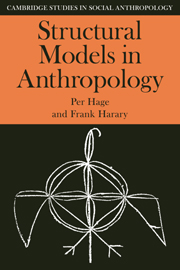6 - Structural duality
Published online by Cambridge University Press: 05 March 2010
Summary
But the nature of opposition is notoriously ambiguous.
David Maybury-Lewis, “Cultural categories of the Central Gê”In From honey to ashes, Lévi-Strauss gives the following analysis of two South American myths on the origin of cultivated plants:
In one way, the Bororo and Machiguenga myths, instead of echoing each other, complete each other. According to the Bororo, man could speak to plants (by means of the whistled language) at a time when the latter were personal beings, capable of understanding such messages and growing spontaneously. Now, communication has been interrupted, or it is carried on through the medium of an agrarian god who speaks to man, and who is answered by man well or badly. The dialogue takes place, then, between the god and men, and plants are no more than the occasion of the dialogue. In the Machiguenga myths, the opposite is the case. Plants, being the daughters of the god and therefore personal beings, converse with their father. Men have no means of intercepting these messages: ‘Los machiguengos noperciben esos eloros y regocijos’ (Garcia, p. 232); but since they are being talked about, they are the occasion of the exchange of messages. However the theoretical possibility of a direct dialogue existed in mythic times, when the comets had not yet made their appearance in the sky. But, at that time, plants were only half-persons, with the gift of speech but so indistinct in utterance that they were unable to use it for purposes of communication.
When completed one by another, the myths are seen, then, to form a total, multiaxial system. […]
Information
- Type
- Chapter
- Information
- Structural Models in Anthropology , pp. 114 - 131Publisher: Cambridge University PressPrint publication year: 1984
